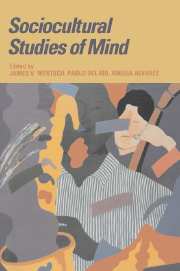Book contents
- Frontmatter
- Contents
- Series Foreword
- List of contributors
- Sociocultural studies: history, action, and mediation
- Part I Human action: historical and theoretical foundations
- Part II Mediation in action
- Part III Sociocultural setting, intersubjectivity, and the formation of the individual
- Part IV Sociocultural settings: design and intervention
- 8 Socio-cultural-historical psychology: some general remarks and a proposal for a new kind of culturalgenetic methodology
- 9 Tossing, praying, and thinking: the changing architectures of mind and agency
- Index
9 - Tossing, praying, and thinking: the changing architectures of mind and agency
Published online by Cambridge University Press: 05 June 2012
- Frontmatter
- Contents
- Series Foreword
- List of contributors
- Sociocultural studies: history, action, and mediation
- Part I Human action: historical and theoretical foundations
- Part II Mediation in action
- Part III Sociocultural setting, intersubjectivity, and the formation of the individual
- Part IV Sociocultural settings: design and intervention
- 8 Socio-cultural-historical psychology: some general remarks and a proposal for a new kind of culturalgenetic methodology
- 9 Tossing, praying, and thinking: the changing architectures of mind and agency
- Index
Summary
“E pur, se muove!” (“In spite of everything, it moves!”)
Quotation attributed to Galileo, who whispered it immediately after he had declared that he accepted the immobility of the earth before a panel of inquisitorsThose of us who try to understand humankind have become entangled in a tension between the illusions of modernity and progress, the legacy of the past two centuries, and the ironic caution of postmodernism, offered as a bridge into the next century. Located between these two positions is what Alvin Toffler (1970) referred to more than 20 years ago as “the furious storm of change.” No one questions the inevitability of change, but in the scientific community it seems that there is little consensus about whether it is prudent to allow it to go beyond the “defense belt” of paradigms, and if so, there is little consensus about how to deal with it.
Neither among scientists nor among citizens is there unanimity on the perception of change. In general, it could be said that a state of uneasiness has arisen over a whole series of events occurring in societies throughout the world. It seems that there is no easy way to respond to this state of affairs. There is the increasingly rapid disappearance of relatively stable traditional societies and long-standing contexts that have been essential for humans' well-being. And the new conditions replacing these contexts bring their own set of problems.
- Type
- Chapter
- Information
- Sociocultural Studies of Mind , pp. 215 - 248Publisher: Cambridge University PressPrint publication year: 1995
- 3
- Cited by



